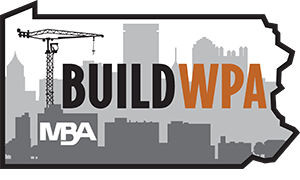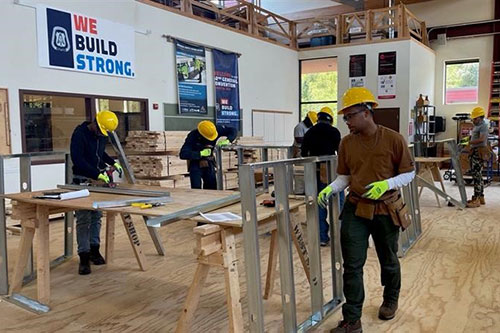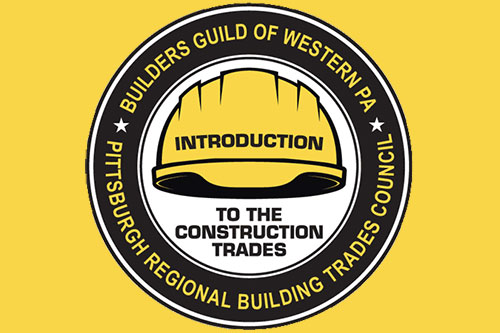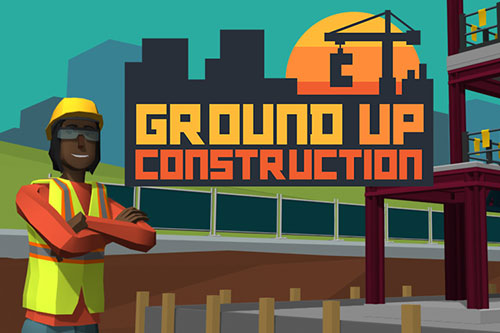Resources
Union Apprenticeship Applications
Review the complete list of programs of interest accept applications.
Visit the pageMBA Career Center
View the career opportunities on the Master Builders' Association's Career Center page.
Visit the Web siteCarpenters' Apprentice Ready Program
CARP's goal is to identify and train motivated Southwestern PA residents that have existing barriers to employment in the building trades.
Visit the Web siteIntroduction to the Construction Trades Course / Trade Up Program
This program includes paid stipend, construction site visits, basic hands-on training, and many other features.
Visit the Web siteCareer Technical Education (CTE) Program
Students will receive instruction from educators who have honed their professional skills in the field of building and construction. Each day, students will actively interact with experienced industry professionals as they prepare for their future endeavors.
Visit the Web siteA. Philip Randolph Institute
A. Philip Randolph Institute is transforming activism in Pittsburgh by educating their community.
Visit the Web siteGames
Discover careers that fit your skills and interests with games that simulate on-the-job interactions and activities.
Visit the Web siteLiteracy Pittsburgh
Free literacy programs in Pittsburgh, PA and Beaver County including GED classes, job training, and more.
Visit the Web siteAcquire a PA Drivers License
Step by step process and all necessary information required to obtain a permit all the way through a license.
Visit the Web site
Build Your Construction Career Path - For the Future
Going on a construction career path has many lanes that all intersect at some point. Your journey can start anywhere at anytime and this is a representation on what that would look like along with the proper steps to succeed on your path.
There are three paths; Apprentice Path (in green), High School/Technology Path (in rust), and the College Path (in blue). You can cross back and forth and explore different career options which could lead you to become the CEO or owner of a company.
Click on any of the colored buttons below to learn more about each opportunity. For a detailed visual of the chart, click here.
FAQ
In a construction apprenticeship program, apprentices learn skills and knowledge from experienced craft professionals. Examples of craft specializations that might be taught through an apprenticeship include carpentry, masonry, plumbing and welding.
An apprenticeship is a paid job where the employee learns and gains valuable experiences. Alongside on-the-job training, apprentices spend at least 20% of their working hours completing classroom-based learning with a college, university or training provider which leads to a nationally recognised qualification.
Construction trade means any trade or occupation involving construction, alteration, remodeling, repairing, wrecking or demolition, addition to, or improvement of any building, highway, road, railroad, dam, bridge, structure, excavation or other project, development, or improvement to other than personal property.
You must be 18 years of age and have a high school diploma or GED. Learn more.
It's advisable to hold a valid driver's license. Also, the construction industry is rapidly changing as workers increasingly use technologically advanced construction methods. Therefore, many skilled crafts require good knowledge of and passing grades in math - including algebra. Learn more.
Absolutely! The average annual pay for a Construction Industry worker in the United States is $64,791 a year. That is approximately $31.15 an hour plus health care benefits and pension. You also start contributing to your retirement from day one. Even though retirement is most likely the farthest thing from your mind, it's never too early to save for it. Most apprenticeships allow you to begin to build your retirement immediately, and in many cases, that means you can retire with over a million dollars!
Nope! No two days in construction are alike, and every job you work on is different. So, you never have to worry about doing the same thing day in and day out. Plus, you can travel. Union workers can travel out of state to work on construction projects. Well-educated, skilled construction workers are in high demand all across the country.
Yes! Generally speaking, the pension plans construction workers contribute to provide them with many years of comfortable retirement, better than that of an average 401 (k) plan. And, depending on when you began your trade, you could retire with over a million dollars!
To learn the trade, you need to enroll in a certified apprenticeship program. Apprenticeships are offered in Western PA, and you can find the right apprenticeship through this site. Apprenticeships are offered to students at little to no cost, which means there's no debt to repay when the apprenticeship is over (unlike that of a traditional four-year, post-high-school education). Earn As You Learn. Not only is there no debt, but also certified apprenticeships offer a living wage from day one! You earn an honest, living wage from your first day. So, you earn a living while you learn your trade. Depending upon your apprenticeship program, you will earn college credits at CCAC, and from there, you can pursue an associate degree in a construction-related field.
Yes, there has never been a better time to pursue your career in the construction industry. Sixteen unions need women and men who are passionate about working with their hands and minds.
You are in control of your destiny in this arena. The Career Path Chart outlines the opportunities for skilled trades, higher education, foreman & supervisor, administrative support, CEO, and entrepreneurship.
Contact Us
631 Iron City Drive, Pittsburgh, PA 15205
412-922-3912














































